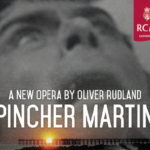This is a guest post by Arabella Currie. Arabella is a Leverhulme Early Career Fellow at the University of Exeter, researching Golding’s engagement with Classics. She holds a doctorate in Classics from the University of Oxford. Alongside academic research, she publishes poems and translations inspired by the classical world.
Golding’s Trojan War: how Homer shaped Golding’s attitude to violence and heroism
At the height of the Second World War, Golding sailed across the Atlantic to pick up a minesweeper fleet, while reading Homer’s Iliad and Odyssey. Both epics remained among his favourite books. He reread them multiple times in Greek, valuing their unexpected comedy, mix of grandeur and prosaic detail, and their subtle construction twinned with repetitiveness, stemming from their origins as oral poetry.
But above all, Homer remained associated with war and violence. Over many years, Golding drafted a retelling of the Odyssey from the point of view of Odysseus’s illegitimate son, set in the turmoil of Nazi-occupied Greece (entitled In Search of My Father). Pincher Martin thinks of Homer while in the middle of the Atlantic during WW2, in a striking echo of Golding’s own experience, imagining himself as the Greek hero Ajax. And in the ‘Sea Trilogy’, Edmund Talbot, though in another war and another ocean, leafs through the Iliad, wondering whether his own voyage can be seen as an epic tale.
However, Golding leaves it to the reader to decide both the validity and value of these Homeric parallels. Were Martin’s heroic aspirations part of what led him to betray his friends? And might Talbot’s vision of himself as a Greek hero reaching out across enemy lines (in reference to the Iliadic story of Glaucus and Diomedes) be a sign of his snobbishness and the rigid class structure on the ship?
Golding’s ambivalence towards heroic archetypes can be seen as part of a wider reassessment of Homer following the horrors of the First and Second World Wars. For many writers and critics, figures such as Achilles and Odysseus ceased to be glorified heroes and became instead examples of the violent ideal of “civilised” or “enlightened” masculinity that lay behind the catastrophes of the twentieth century. Perhaps this is why Golding ends the ‘Sea Trilogy’ with Talbot’s realisation that his voyage was not a version of Greek heroic myth after all. Rather, it stood only for itself, in its flawed and unheroic specificity –
‘It was no Odyssey, no paradigm, metaphor, analogue – it was the ridiculous sorrows of Edmund Talbot, whom life no longer spoiled as if he were its favoured child.’
That said, Golding does open up other forms of heroism in the ‘Sea Trilogy’. Far from rejecting Homer, he uses the epic as a framework in which to imagine other possibilities of heroic myth – the Reverend Colley’s tragicomic nobility, for example, or Miss Granham’s refusal to bow to gender norms.
In autobiographical essays, Golding wrote about his own struggle between an oppressive and a liberating form of Homeric heroism. On the one hand, looking back to his childhood in ‘Billy the Kid’, he remembers how the exploits of Achilles inspired him with a desire not for glorious ideals but ‘to be a successful bruiser’, ‘hewing and thumping like Achilles’. On the other, he recalls in ‘The Ladder and the Tree’, how, at around the same age, he formed his own less violent relationship with the Homeric heroes when sitting up a tree in his garden, reading about Odysseus. Suddenly, he seemed to come face to face with the epic –
‘I know something about Odysseus that is not in the text, since I have seen and touched him. When he washed up in Phaeacia his hands were white and corrugated and his nails bled – not because of the rocks but because he bit them. I saw him, crouched naked beneath the stunted olive, shuddering in the wind, salt drying on his skin, lugging with white teeth at the nail of his third right finger while he peered at the dark, phantom dangers and wondered fearfully what to do.’
Encountering Odysseus in this way, Golding saw something new about the epic hero and felt a close parallel with him – peacefully, on his own terms and acknowledging fear rather than asserting a hyper-masculine violence. Perhaps it is these memories that lay behind his later habit of narrating Homeric stories to his grandson while on family holidays beside the sea, resurrecting the ancient oral tradition and telling the old stories in a new way.
